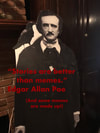Sacred Chickens
Menu
SACRED CHICKENS
 A Few Rambling Thoughts by Julie Carpenter We seem to live in a world of sound bites and memes. Every day on Facebook we see pithy sayings and joke pictures that try to sum up complex matters with a single quote (often enough attributed to someone who never said any such thing.) Sometimes the meme pretends to state a fact. Sometimes these facts are true, more often they are not. On rare occasions, if I feel that person posted the meme in good faith and would want to know if they are spreading a lie, I will double check and let them know. By and large, of course, these are not posted with any purpose other than to plant a tribal flag, to let people know which side you are on. There’s no point in checking these facts or disputing these memes; they are not arrived at by any rational thought process. They’re simply posted as symbols, meant to delineate the “good” from the “bad” and mark the poster as one of the “good”. It’s almost impossible to combat this type of thought process. These posts strip away context and flatten everyone into a hero or a villain. One meme type that puzzles me the is the “everyday hero.” I can’t find it right now, but I recall a FB post which consisted of a picture of a middle-aged white man in a plaid shirt and an elderly white woman at a restaurant with a caption about how this son was visiting his elderly mother in a nursing home and wasn’t that a huge surprise in this day and age and wasn’t he a hero? It wasn’t a personal picture of the poster, but a viral picture I saw in several feeds. I am a middle-aged woman and almost everyone I know with elderly parents in nursing homes visits with them. The unspoken subtext of this meme seems to be that this bastion of middle America is doing something that “those people” don’t do. Who those people are is not clear, but the poster finds sainthood easily achievable by just acting as a normal person would in juxtaposition. I’ve been thinking about memes and sound bites a lot lately and what if anything can counteract the flattened, reductive world of social media. The only thing I can think of is stories. Often memes will trigger my memory and a story will come floating to the top, some narrative connects itself to my train of thought. Here’s an example. Before the 2018 mid-term election, I saw an awful lot of memes about how cruelty to undocumented immigrants is excusable because they are breaking the law. Doesn’t matter if this is a desperate attempt to feed their families. Doesn’t matter if the companies who benefit from this under-the-table labor also benefit from the fact that they can procure workers with no recourse when it comes to treatment or wages. None of this matters because undocumented immigrant broke the law. All this is beside the fact that asylum seekers are not breaking the law by coming to ports of entry. The point of these memes is the idea of law breaking and the fact that it allows for an almost infinite progression of punishment. A story from my childhood came to mind, one that I bet a lot of the people sharing these memes read with empathy. The story comes from the book The Long Winter, by Laura Ingalls Wilder. The Ingalls sense that the winter will be a bad one and they move to town. By the end of the winter, the settlers are starving. Pa goes to Almanzo Wilder’s store, deduces where he and his brother, Royal, are storing seed in the wall, opens it and fills his bucket. He pays for it afterwards, but the Wilder boys have put it up for seed. They need it for the spring planting. Pa takes it without asking. Pa’s family is starving, and it’s a moral calculation that he feels comfortable with. This is a context in which we see someone doing something that would be morally unacceptable in other circumstances. On any ordinary day, if Pa casually walked in and filled a bucket with grain from a hidden cache , it might get him a good punch in the nose, at least before Almanzo married Laura. Or try walking into a grocery store and casually walking in the back and getting something out of the back room where the inventory is without asking first. In this situation though, I can’t imagine one reader thinking that Mr. Ingalls was wrong. We know the context. We accept that there are circumstances that might require such moral calculations. We extend this moral courtesy to Pa for a couple of reasons. One because his story is told so well. Two, because many of us identify with him. There's another story that came to mind, a news story. A young man's wife, who had already lost a leg to cancer was manifesting symptoms of a stroke, and he was speeding with her to the hospital. Their home was close enough that it was quicker fo him to take her than to call an ambulance. A police officer followed him, cursed at him and attempted to arrest him as he was taking his wife into the hospital. There is no doubt he was breaking the law, but everyone, including the judge, agreed that his wife's life took precedence over the law. In the context of this situation, we can see that breaking the law is only a small part of the story. This begs the question: why can't we sympathize with others whose families are in crisis? Why do we strip context from people if they differ from us in skin color, religion, gender and sexuality? What context are we flattening, removing, reducing? What makes us villainize people? What is the thin line that separates their stories from ours? How often do I make the mistake of disallowing context myself? So, what am I trying to say here? I don’t know if I’m sure, other than the fact that we should extend others the courtesy of their stories, their context, their narrative. And memes and sound bites don’t allow for that. I think there’s certainly a deeper problem. Content is the poison, the meme the dart that lands it. Still, I think it can pay to think about the how of communication as well as the what. And those are my rambling, half-formed thoughts for the day.  Bio: Julie Carpenter is the creator of the Sacred Chickens website. She is dedicated to telling stories and making sure that indie writers and publishers have a way to be heard. She uses narrative, her own and others’, to help interpret the world. She has a Master of Professional Writing from the University of Memphis, with an emphasis in Composition Theory. She wants to bend reality one story at a time. Julie’s work has appeared in Fiction on the Web and will be included The New Guard. She is currently working on a novel.
0 Comments
Leave a Reply. |

Click Photo above to buy ebook or paperback from Amazon.
Here's the link to Barnes and Noble Or order through your favorite independent bookstore! Categories
All
|
 RSS Feed
RSS Feed